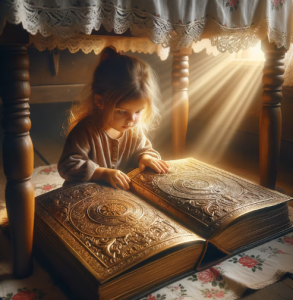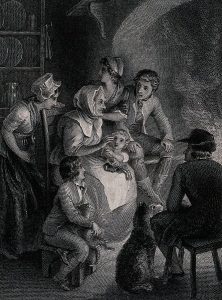The human brain craves story.

Creator: Easy-Peasy.AI Credit: Easy-Peasy.AI AI Image Generator
Copyright: Easy-Peasy.AI – AI Image Generator
Our brain seems wired to remember things when it is attached to story. How? We remember the story, then the facts of the story are simply the details that support the story. Think about it. can you remember song lyrics of songs you have not heard in decades? While you may not remember all the facts, can you remember the storyline of most of the movies you have ever seen?
People even create stories in order to remember. Have you ever tried it? Write down a list of 15 items in the room you are in. Wait 15 minutes, then try to remember as many as you can. Now write down another 15 items. But this time, create a story around those objects. Wait 15 minutes, then retell that story and see how many items you recall.

Emotions are great story telling devices. Creator: Easy-Peasy.AI Credit: Easy-Peasy.AI – AI Image Generator
Copyright: Easy-Peasy.AI – AI Image Generator
We talk about people getting lost in a book, where they are reading the pages, but their imagination takes them to a highly visual interpretation of that story. Or have you been in a movie where you were so immersed, it was as if you felt like you were part of the story itself. There are even stories where getting lost in a story IS the story; think about Never Ending Story with the boy riding on the back of a flying dog.
And it makes sense why this developed; think about it, as humankind evolved there were things we needed to remember, to know, to pass down….and there was a time where writing was not a part of our capabilities, so stories were all we had. The verbal stories were our libraries and our Google.What does this tell us? How does this apply to learning and education? If we know that story helps the mind remember deeper and better, then it makes sense to build a story around the lesson topics.
Learning is about new vocabulary and terminology, new processes, foreign ideas, new skills. A list of 3 of these. 4 categories of those. 5 steps to do this. The 6 reasons an event happened. That is one way of presenting and learning information. But, all this random information does (can) actually tell a story. Depending on our target audience, when we create learning, we can build that story into the learning. An engaging instructor can weave story throughout the content.
What does that look like for modern learning creators?
Start out with a character of a story that has a problem to solve. As the lesson evolves, keep revisiting that story with the character getting the skills s/he needs in order to address the problem. And don’t stop there, add real emotion by incorporating real situations, real problems, real interactions, real places and events. Yes, I mean add happiness, sadness, shock, fear, and surprise. Let your learners ‘feel’ the learning by relating to it through a story. Let the important concepts, ideas, topics, steps, and skills be important elements of the story, in fact so important that they are vital to understanding the complete story.
Did you have a teacher who told stories?


